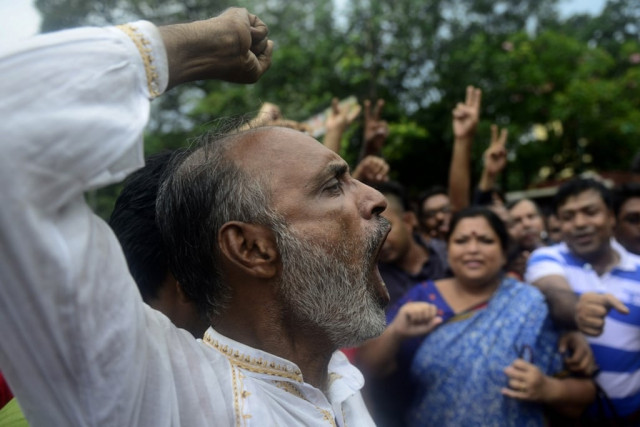One dead as Bangladesh Jamaat-e-Islami protest death penalty
A rickshaw driver died after being hit with stones during the protest.

Bangladeshi social activists shout slogans in Dhaka on September 17, 2013, after a verdict was delivered against Abdul Quader Molla, the fourth-highest leader of the Jamaat-e-Islami party. PHOTO: AFP
A rickshaw driver died after being hit with stones during a protest in southern Bangladesh by supporters of JI.
Elsewhere, brick-throwing demonstrators battled with police who retaliated with rubber bullets and tear gas, officers said.
The violence comes as towns and cities shut down after JI called a nationwide strike to protest the death sentence handed on Tuesday to Abdul Quader Molla for crimes committed during the 1971 war.
"The autorickshaw driver came under attack from Jamaat supporters at a place called Talerchar this morning. He was hit by several stones," said Anisur Rahman, police chief of the coastal district of Noakhali.
"He was rushed to a hospital at Companyganj in Noakhali where the doctors declared him dead," Rahman told AFP.
The Supreme Court sentenced Molla to death, toughening the sentence originally handed down by the country's war crimes tribunal, and rejecting an appeal for acquital by his defence lawyers.
Molla, 65, the fourth-highest leader of Jamaat, had been given a life sentence in February by the International Crimes Tribunal. That sentence sparked deadly protests and riots by his supporters but also by secular activists on the other side who considered it too lenient.
The tribunal has since January convicted six JI leaders of crimes related to the 1971 war.
In the northwestern city of Rajshahi on Wednesday, police fired rubber bullets and tear gas to disperse scores of rock-throwing Jamaat protesters, police inspector Ziaur Rahman told AFP.
Protesters also threw small, home-made bombs at police in the capital Dhaka and in the southwestern city of Khulna during small street rallies, private television Channel 24 reported.
Police said security was tight in the capital with thousands of police and paramilitary border guards patrolling the streets. Schools, shops and many offices were closed on the first day of the 48-hour strike. Inter-district motorways were empty and bus services have been suspended.
Molla's sentence drew strong criticism from global rights groups with the International Commission of Jurists, calling it "incompatible with international principles of fair trial".
Amnesty International said: "This is the first known case of a prisoner sentenced to death directly by the highest court in Bangladesh. It is also the first known death sentence in Bangladesh with no right of appeal."



















COMMENTS
Comments are moderated and generally will be posted if they are on-topic and not abusive.
For more information, please see our Comments FAQ